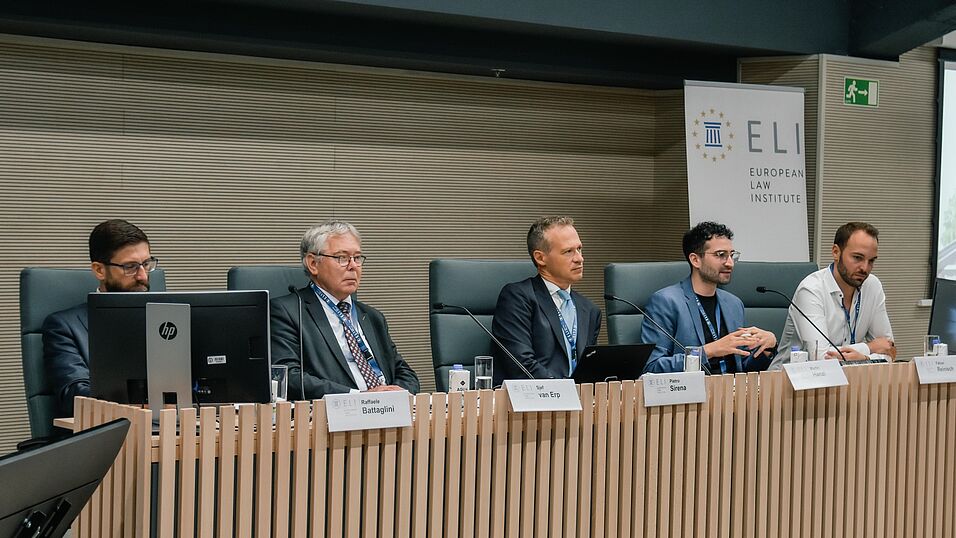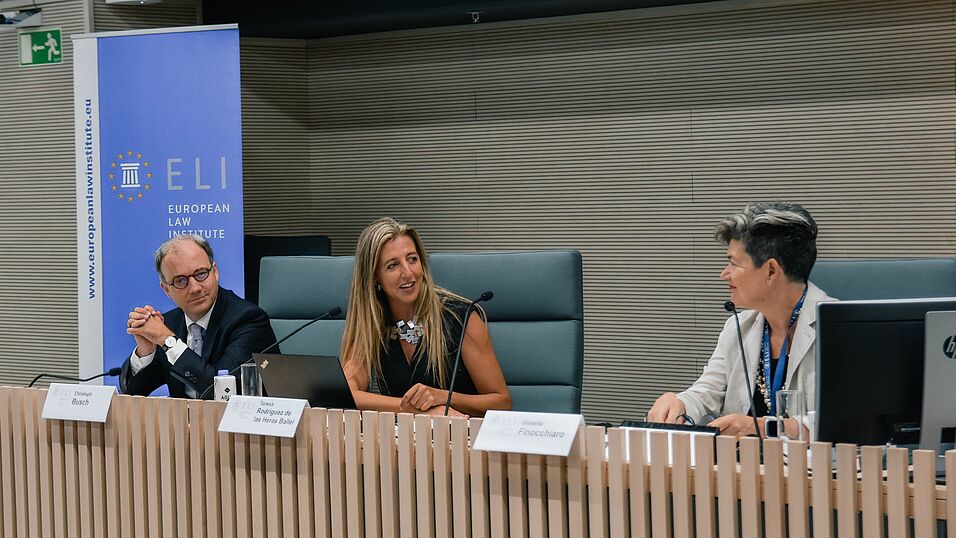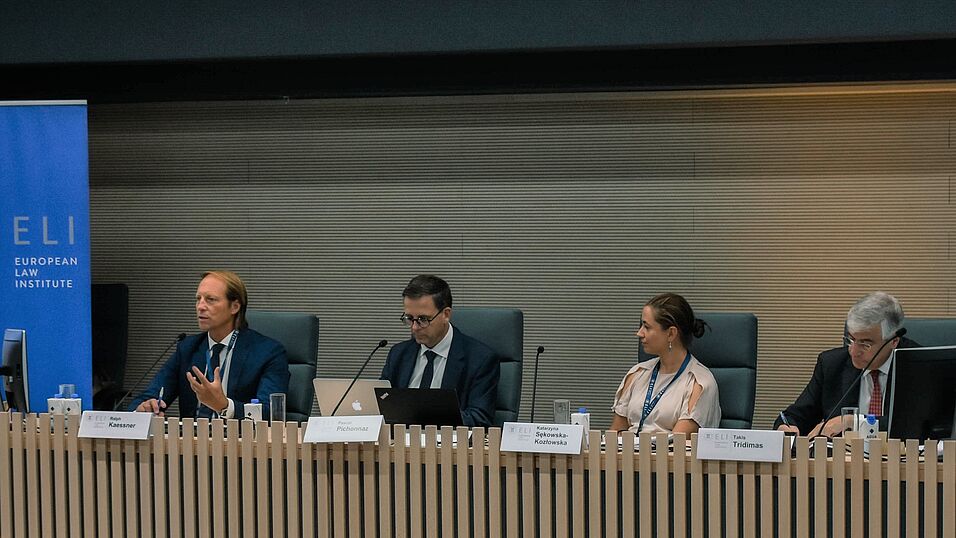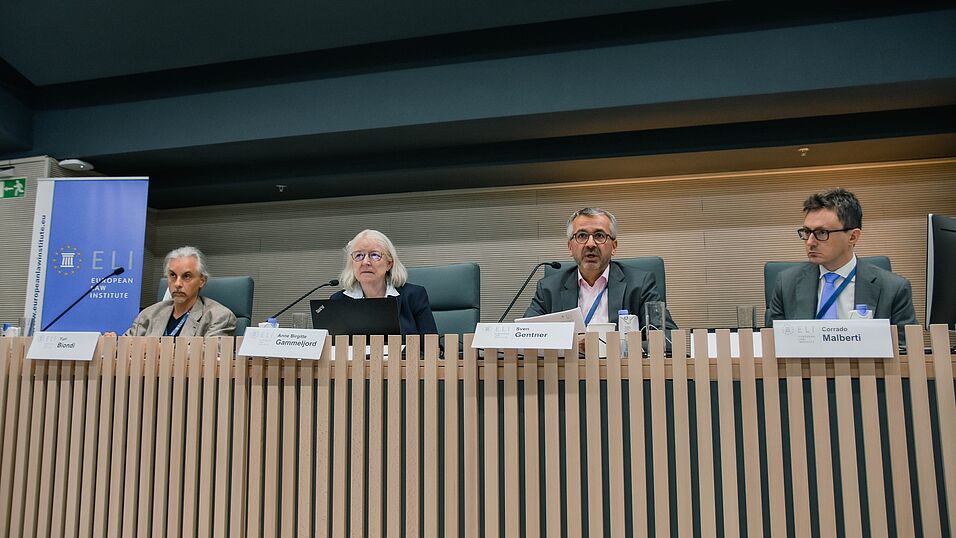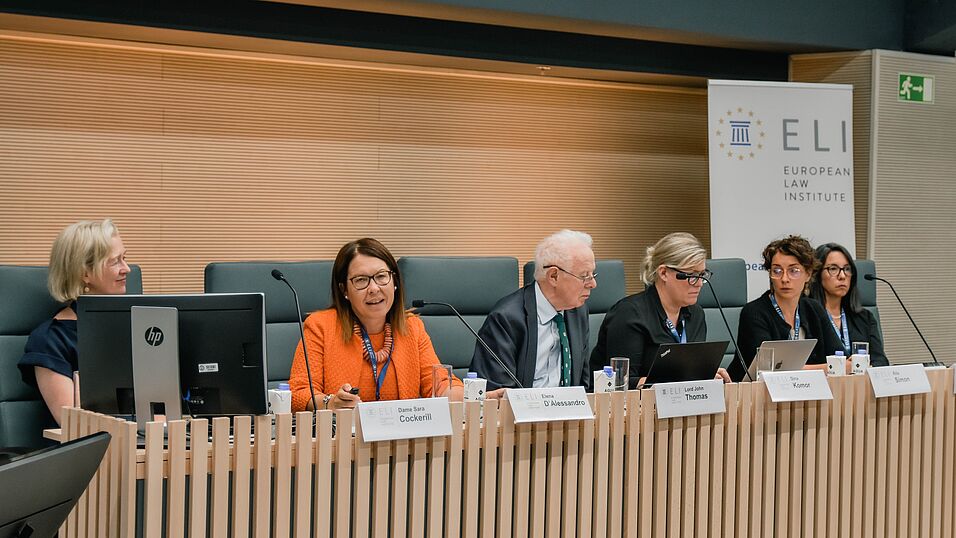During the first session on Blockchain Technology and Smart Contracts, Pietro Sirena (Chair; ELI Treasurer; Professor, Bocconi University) announced the results of the ELI Membership vote on the project, which was approved by an overwhelming majority. He congratulated the Reporters and all those involved in the elaboration of the ELI Principles on Blockchain Technology, Smart Contracts and Consumer Protection. Sjef van Erp (Project Co-Reporter; Emeritus Professor, Maastricht University), Martin Hanzl (Project Co-Reporter; New Technologies Attorney, Ernst&Young), Dirk Staudenmayer (Head of Unit, Contract Law of the DG Justice and Consumers, European Commission), Fabian Reinisch (Lawyer, Vice-President of Legal, Bitpanda) and Raffaele Battaglini (founder of Futura Law Firm) discussed innovative aspects of the ELI Principles, which include, among others, imposing a duty on businesses to code contracts in a particular way. The panelists agreed that smart contracts can be legally binding and therefore can form a legal declaration, a letter of notice, a declaration of intent, etc. Smart contracts should also be programmed in a certain language, depending on if they are B2C or B2B, in clear and concise terms. Dirk Staudenmayer discussed three digital waves which EU private law has had to adapt to and emphasised that new ground-breaking technologies will make a huge difference not only in the world of AI, but also in the area of contracting. Fabian Reinisch highlighted that the ELI Principles will provide certainty and a framework in a still quite uncertain digital space. Finally, Raffaele Battaglini stressed the importance of working together with software developers in order to make them aware of these legal issues to achieve the most appropriate technical solutions.
The following panel focused on the new ELI project on Guiding Principles and Model Rules on Algorithmic Contracts, which was initiated in 2022. The project’s work on developing Guiding Principles was presented by Teresa Rodríguez de las Heras Ballell (Chair; ELI Executive Committee Member; Project Co-Reporter; Associate Professor, University Carlos III of Madrid; Sir Roy Goode Scholar at UNIDROIT (2021–2022)). Christoph Busch (Project Co-Reporter; Professor, University of Osnabrück) presented the project’s work on (future) use cases and scenarios in the context of algorithmic contracts and consumer law. Maria Peltoniemi (Policy Officer, European Commission) presented the European Commission’s feedback and underlined the need for such principles in the European legal community. She praised ELI’s decision to cover B2B in the project and highlighted that this project could be extremely useful and beneficial for the legal community, specifically for the market and consumers. Finally, Giusella Finocchiaro (Professor, University of Bologna; co-founder and partner of DigitalMediaLaws, Chairperson of the UNCITRAL Working Group on Electronic Commerce) presented the international perspective through UNCITRAL’s framework and its functional approach to this topic. The Q&A session focused primarily on the topics of consumers’ right to information, the possible inclusion of sustainability principles in the automated decisions, and at what point human intervention is necessary in the automated selection process.
Pascal Pichonnaz (ELI President; Professor, University of Fribourg), chaired the panel on the ELI project on Fundamental Constitutional Principles, which featured Takis Tridimas (Project Co-Reporter; Professor of European Law, King’s College London); Pauline Koskelo (Finnish Lawyer; Judge, European Court of Human Rights); Katarzyna Sękowska-Kozłowska (Assistant Professor, Institute of Law Studies of the Polish Academy of Sciences) and Ralph Kaessner (Head of Unit for Fundamental Rights and Values and Rule of Law). Takis Tridimas noted that there has been a regression in liberal democracies, adding that there are fewer in Europe than 10 to 15 years ago. He stated that the drafting of the Principles is not intended to replicate the drafting of a treaty or constitution, but to define some common values. Pauline Koskelo provided in-depth feedback on the Principles, and shared some ideas on how to improve the text further. Sękowska-Kozłowska emphasised the lack of explicit mentioning of the equality of men and women in the Principles, and suggested a non binary approach with regard to gender issues be adopted. Finally, Ralph Kaessner explained the strong interaction between politics and law in this area, emphasising enforcement difficulties and political sensitivities when violations of fundamental EU values occur.
The next panel on the Draft ELI Guidance on Company Capital and Financial Accounting for Corporate Sustainability was chaired by Anne Birgitte Gammeljord (Chair; Second ELI Vice President; Lawyer, Danish Supreme Court; Assistant Lawyer, Maritime and Commercial Court). Corrado Malberti (Project Co-Reporter; Associate Professor of Commercial Law, University of Trento) spoke about the main thesis behind the project. Afterwards, Yuri Biondi (Project Co-Reporter; senior tenured Research Fellow of the National Centre for Scientific Research of France, University Paris Dauphine PSL) gave an overview of the draft Guidance, mentioning the set of recommendations contributing to the European framework in line with the EU’s work on corporate sustainability. Following this general presentation, Sven Gentner (Head of Unit for corporate reporting, audit and credit rating agencies in the European Commission’s Directorate-General for FISMA) presented the final agreement on the Corporate Sustainability Reporting Directive (CSRD), the work that is being done to establish European Sustainability Reporting Standards, and how these would interact with international standards. Kerstin Lopatta (Professor, University of Hamburg) specifically spoke on the impact ‘materiality’, highlighting that stakeholders want more guidance on how to deal with the ‘materiality’ assessment and its definition. Finally, Colin Haslam (Project Co-reporter; Professor of Accounting and Finance, Queen Mary University of London) closed the presentation by highlighting the project’s aim to reinforce financial capital law, by setting out these Principles, company law can be changed at its foundation and make investors aware of risks. The Q&A session allowed discussion around transparency for consumers, behaviours around CO2 emissions, greenwashing and the impact of the war in Ukraine on the implementation of the CSRD.
The final panel focused on the ELI project on Third Party Funding of Litigation (TPLF). The Chair of the panel, Lord John Thomas (First ELI Vice-President; Lord Chief Justice of England and Wales from 2013–2017; President of the Qatar International Court; practicing arbitrator) opened the panel and introduced the speakers. Dame Sara Cockerill (Project Co-Reporter; High Court Judge; Judge in Charge of the Commercial Court of England and Wales) introduced the ELI project on TPLF, aiming at developing a set of principles to assist parties in TPLF proceeding. Elena D’Alessandro (Full Professor of Civil Procedure, University of Turin; Co-Author (with Cristina Poncibò) of a research paper for the European Parliament on the ‘State of Play of the EU Private Litigation Funding’)) presented the European Parliament’s work on the TPLF industry and expressed her belief that the ELI project can play a crucial role and be inspiring for the European Parliament. Dina Komor (Senior Investment Manager and Legal Counsel, Omni Bridgeway) and Rita Simon (Senior Researcher, Czech Academy of Sciences and at the Centre for Comparative Law, Charles University in Prague) analysed legal difficulties in the TPLF industry from a practitioner’s perspective and stressed the importance of guidance in the field. Helena Soleto Muñoz (Professor in procedural law, conflict resolution, and restorative justice, Universidad Carlos III de Madrid) commented on the topic from the criminal law and Spanish law prospective and congratulated the Reporters on the methodology, particularly on their decision to include practitioners in the team. There was consensus among panellists that the project can play a central role in providing guidance in this field and can be of inspiration at the EU level in managing TPLF risks, while maintaining its benefits. A lively Q&A followed on topics such as crowd-funding, contingency fees, settlements, class actions, and more.

